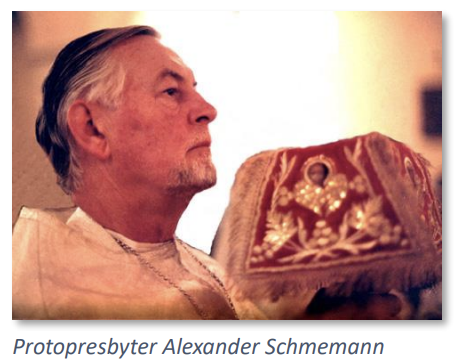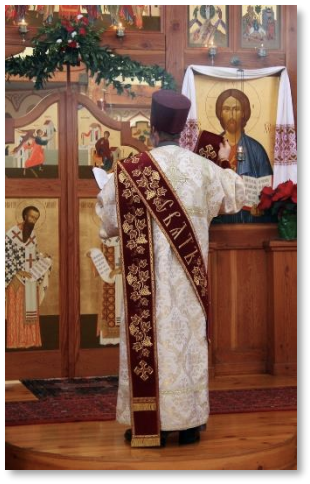The Great Litany
That is why the Great Litany, the intercession which the Church makes for the world with all its needs, begins with the diaconal bidding “In peace let us pray to the Lord.” This bidding does not simply remind those praying that they should be of peaceful mind while they are praying, and not in a state of distraction or agitation. The peace of which the deacon speaks is the peace of Christ, and the deacon is here bidding the faithful to pray as members of Christ’s Body, for to be “in Christ” is to be “in peace”, since “He is our peace.”
Fr. Alexander Schmemann reminds us of this in his book The Eucharist. Concerning this bidding and this Great Litany, he writes,

Do we understand that this is not ‘simply’ the prayer of a man or a group of people, but the prayer of Christ himself to his Father, which has been granted to us, and that this gift of Christ’s prayer, of his mediation, of his intercession is the first and greatest gift of the Church? We pray in Christ, and he, through his Holy Spirit, prays in us, who are gathered in his name.1
To pray “in peace” is therefore to pray as a part of Christ’s Body, so that Christ Himself prays through us, offering acceptable prayer to his Father.
We should take time to remember that originally this litany and these prayers of intercession were not offered in their present position at the beginning of the Liturgy, but only after the catechumens had been dismissed. For these were the prayers of the faithful, of the royal priesthood, the baptized believers, the Body of Christ. Catechumens, being unbaptized, were not yet a part of that Body or that priesthood, and so they could not offer those priestly intercessions for the world.
It was for this reason that the Kiss of Peace or the holy Kiss was only given among the faithful after the catechumens had departed. As the Apostolic Tradition directs, the catechumen “shall not give the Peace, for their kiss is not yet holy.”2 It was only after the catechumens had been baptized and their kiss made holy that they were allowed to join the others in passing the Peace and offering the Church’s intercessions for the world as the prayer of Christ’s Body. It was only after the universal rise of infant baptism and the effective demise of the catechumenate that prayers and actions once done later in the Liturgy after the catechumens had left (such as the Great Litany) could be transferred to other places in the Liturgy and done anytime.
The first petition in the Great Litany asks for salvation for those who are assembled in peace. The deacon bids the faithful, “For the peace from above and for the salvation of our souls, let us pray to the Lord.” This again reveals the eschatological nature of the Kingdom of God, of our salvation, and of the peace which constitutes that saving kingdom. It is not a peace coming from the world, having its power and origin in political agreements, treaties, and the strength of armies to enforce them. Peace from below is indeed a political peace, and therefore is as fragile as human politics. The second of the Liturgy’s antiphons (from Psalm 146) warns us to “put not your trust in princes”, since as fragile human beings the peace they establish is a fragile as they are.
When his spirit departs, he returns to the earth and on that very day his plans—his agendas, his treaties, his peace—all perish.
But the peace that we experience is from God above, and the peace and salvation that He gives to us can never perish or suffer diminution. In praying for the peace from above, the Church confesses that it belongs to a kingdom which can never perish, and  which can never be troubled by the tribulation which reigns in this world. This petition confesses and exults in the unbreakable union that exists between Christ and His Church, between the Head and the Body. Wherever the Church sojourns on the earth, and under whatever political system, and in whatever trouble it may find itself, its peace remains serene and unbreakable, for it comes from above, where Christ is seated at the right hand of God.
which can never be troubled by the tribulation which reigns in this world. This petition confesses and exults in the unbreakable union that exists between Christ and His Church, between the Head and the Body. Wherever the Church sojourns on the earth, and under whatever political system, and in whatever trouble it may find itself, its peace remains serene and unbreakable, for it comes from above, where Christ is seated at the right hand of God.
If the first petition of the Great Litany reveals the eschatological nature and eternal safety of the Church in this world, the next petition reveals the Church’s concern for the world in which it lives and sojourns. In this petition, the deacon bids the faithful to pray “for the peace of the whole world, for the welfare of the holy churches of God, and for the union [i.e., the unity] of all.” Though the Church remains safe and secure in God’s peace, it is not unconcerned for the world or for the plight of its neighbours and fellow men. The Church’s lot in this age is tied up with its fellow men, and the disasters which strike the world affect the Church as well.
The Church therefore begins by asking God to extend the peace that the Church experiences in saving fullness to the world as well, insofar as the world can receive it. The Church prays “for the peace of the whole world.” It knows only too well how war affects all, slaying the young soldiers, killing old men and non-combatants, destroying crops and fields so that famine and hunger hurt everyone in the land. It therefore prays that the world may be spared such conflict according to God’s mercy and will, even though it knows that in this age wars are inevitable.
And since the Church prays as Christ’s Body and with the kind heart of the Master, its concern is universal—it does not pray only for the peace of those closest to it or for the peace of those it likes, but for the peace of the whole world (Petitions 3–8) That includes peace for nations and peoples that might be political enemies, such as Parthians nearby or barbarians far off. Christ loves all the world, and so the Church intercedes for everyone without distinction. This was also the practice of St. Paul, who taught his converts to “make entreaties and prayers, petitions and thanksgivings on behalf of all men, for kings and all who are in authority, in order that we may lead a tranquil and quiet life in all godliness and dignity” (1 Tim 2:1–2). As well as a desiring that men not be afflicted by the evils of war, Paul knew that political peace was a precondition for preaching the Gospel. Peace on earth was an advantage to the Church as it pressed on to fulfill its evangelistic mission.
This concern for the affairs of the world includes a prayer “for the welfare of the holy churches of God,” for their stability, health, and good functioning. Foremost in this good health is the union of all the churches as they are maintained in their unity, holding the same faith in truth and love. Heresy, false teaching, selfish ambition, and angry egos can work to bring schism and to divide, and this would impede their mission and damage their salvation. Since the health and salvation of the world depend upon the Church in its midst (whether the world knows this or not), prayer for the world’s peace necessarily also must include prayer for the welfare and unity of the Church. Thus, even in the pre-Constantinian years the Church and the world were united in a kind of symbiosis. The good functioning of each was bound up together in a measure of mutual dependence. The gift of God’s peace to the Church was given to be shared with the world.
Read more: The Great Litany (opens in a new tab), Liturgical Prayer (opens in a new tab)